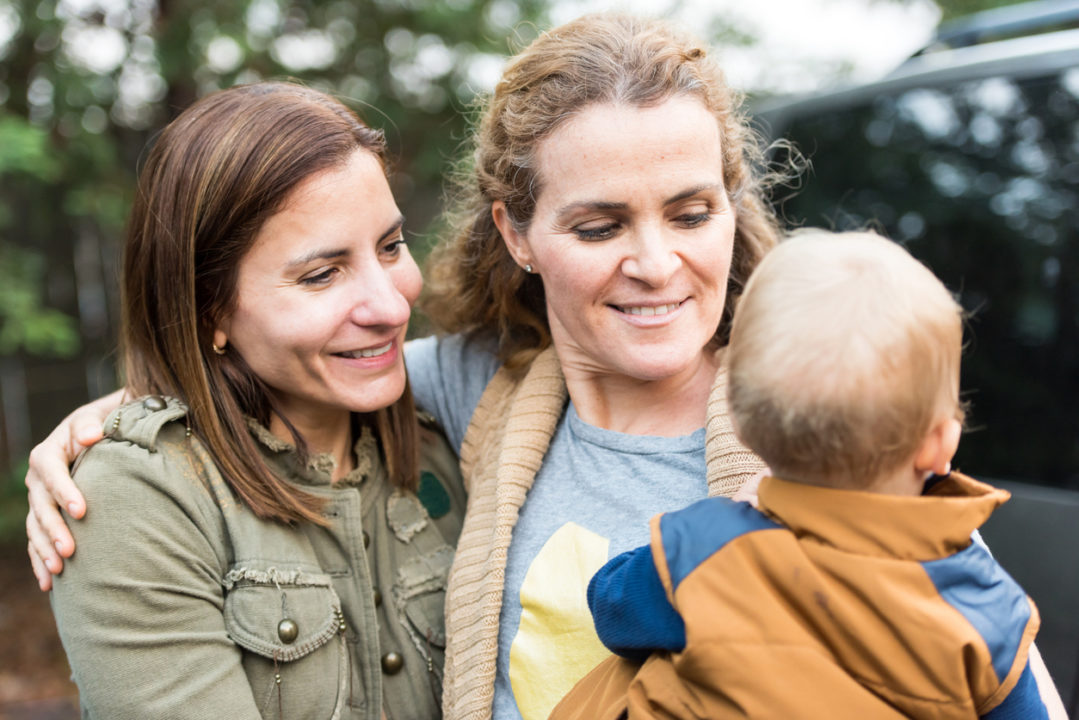Non-Traditional Families and the Law
 Families today don’t always follow the “Mom-Dad-Kids” template. Around San Diego, you’ll find LGBTQ+ co-parents, polyamorous families, platonic co-parents, cohabiting exes, stepparent blends, and chosen families of every kind. Yet, California’s legal framework, which is built largely for traditional two-parent, biological scenarios, can leave these modern families vulnerable.
Families today don’t always follow the “Mom-Dad-Kids” template. Around San Diego, you’ll find LGBTQ+ co-parents, polyamorous families, platonic co-parents, cohabiting exes, stepparent blends, and chosen families of every kind. Yet, California’s legal framework, which is built largely for traditional two-parent, biological scenarios, can leave these modern families vulnerable.
Multi-Parent Families
A family can have multiple parents for a number of reasons. Sometimes, there are stepparents involved. Sometimes, one parent gets a new partner. Also, some polyamorous relationships may share children.
In California, courts are allowed to acknowledge more than two parents for a child. This allows stepparents and others to be added by court order without anyone relinquishing parental rights. Without these rights in place, non-biological partners risk losing medical decision-making authority, inheritance rights, or access in emergencies.
In California, 64% of children live with two parents, while 24% live only with the mother. An additional 4% of children live with non-parent relatives. Estimates show that between 4% and 15% of children live in cohabiting couple homes, and between 0.2% and 1.1% live in same-sex couple homes.
LGBTQ+ Parents and Second-Parent Adoption
LGBTQ+ families in California have a stronger legal footing than most, but gaps still exist. Although same-sex partners are presumed parents when married and listed on a birth record, that doesn’t guarantee protection beyond state lines. A confirmatory (second‑parent) adoption solidifies parental rights for medical, educational, and interstate recognition.
Similarly, unmarried elective co-parents should sign a Voluntary Declaration of Parentage or pursue adoption to formalize custody, especially if reproductive assistance is involved.
Additional Non-Traditional Families
Some San Diegans share parenting responsibilities with extended family or friends outside romantic relationships. Known as chosen families, they often use tools like powers of attorney, healthcare directives, co-caregiving agreements, and even guardianships to ensure access and decision-making rights. Unfortunately, these contracts don’t guarantee legal standing, so while they’re essential, they should be paired with formal legal recognition.
For cohabiting exes or platonic co-parents, de facto parent status can be pursued under the Uniform Parentage Act and California law, which is needed to secure visitation or custody rights if challenges arise.
Legal Options to Secure Family Rights
The legal system in California offers several tools to help non-traditional families create lasting, enforceable parental relationships, but you have to be proactive. The law tends to favor biological or married parents by default, so if your family doesn’t fall into those categories, you need to take certain specific legal steps to ensure all caregivers and children are protected, such as the following:
- Adoption. California is one of the more progressive states when it comes to allowing second-parent and even third-parent adoptions. This process allows a non-biological or non-married parent to become a legal parent without terminating the other parent’s rights.
- De Facto parent status. A de facto parent is someone who has assumed the role of a parent in a meaningful, consistent way, even if they aren’t a biological or adoptive parent. This is a powerful option for stepparents, cohabiting exes, or platonic co-parents who haven’t formalized their legal rights but act as a parent in practice. However, this is not automatic, and forms must be filed to officialize it.
- Voluntary Declaration of Parentage (VDOP). The VDOP is a relatively simple form that can carry significant legal weight. It’s often used when a child is born to unmarried parents or through assisted reproduction. In LGBTQ+ or elective co-parenting arrangements, signing a VDOP ensures that both intended parents are recognized legally, even without going through court.
- Parenting agreements. While they don’t carry the same weight as a court order or adoption, written parenting agreements can be essential in defining responsibilities, rights, and expectations, especially in less conventional arrangements like platonic co-parenting or polyamorous families.
- Court petitions. In some cases, a non-parent may petition the court for custody or visitation, especially if the biological parents are unable or unwilling to care for the child. California law allows third parties, such as grandparents, close friends, or long-term caregivers, to file such requests if it’s in the child’s best interest.
About Andrew J. Botros, APC
Andrew J. Botros, APC, proudly based in San Diego, uses both compassion and courtroom experience to serve families of every structure. Attorneys Andrew J. Botros and Matthew S. Blado are both Board‑Certified Family Law Specialists with deep knowledge in multi-parent adoption, de facto parent recognition, and LGBTQ+ parental rights. We can help you secure your family rights, even in non-traditional homes.

FAQs
Q: What Is a Non-Traditional Family in California?
A: Legally speaking, a non-traditional family is one that does not follow the typical structure of a biological mother and father and child or children. This includes polyamorous parenting, LGBTQ+ co-parents, platonic parenting partners, or extended family raising children. California doesn’t rigidly define family structures, but legal protections vary based on how the family is structured and whether formal legal steps, like adoption or agreements, have been taken.
Q: Can More Than Two People Be Legal Parents in California?
A: Yes, California is one of the few states that allows a child to have more than two legal parents if it’s in the child’s best interest. Courts may grant this status in polyamorous or blended family situations. This usually requires a court order and, sometimes, a third-parent adoption, so legal guidance is strongly recommended.
Q: Do LGBTQ+ Parents Need to Adopt Their Own Children?
A: While not required, it is highly recommended that LGBTQ+ parents adopt their own children. Even if both parents are listed on a child’s birth certificate, second-parent adoption is strongly advised, especially for unmarried LGBTQ+ couples or families conceived through assisted reproduction.
Without legal adoption, one parent’s rights may not be recognized if the family travels out of California or during custody disputes. Adoption provides stronger, more permanent legal protection.
Q: Can Non-Traditional Parents Draft Their Own Parenting Agreement?
A: Yes, non-traditional parents can draft their own parenting agreement, but it’s recommended to work with a family law attorney. Parenting agreements are created outside of court, especially for non-traditional arrangements like platonic co-parenting or multiple caregivers.
These can help define roles and expectations. While not always binding, courts often consider them if custody issues arise. A well-drafted agreement can prevent misunderstandings and serve as a roadmap if conflicts occur.
Contact Us Today
If your family doesn’t fit the traditional mold, ensure everyone is legally protected. Reach out to Andrew J. Botros, APC in San Diego for professional help with multi‑parent adoption, de facto parent petitions, or tailored parenting agreements. Let us help secure your family’s future.
Feel Free to Contact Our Office with Any Questions
858-793-8884
 San Diego Divorce Attorneys Blog
San Diego Divorce Attorneys Blog


